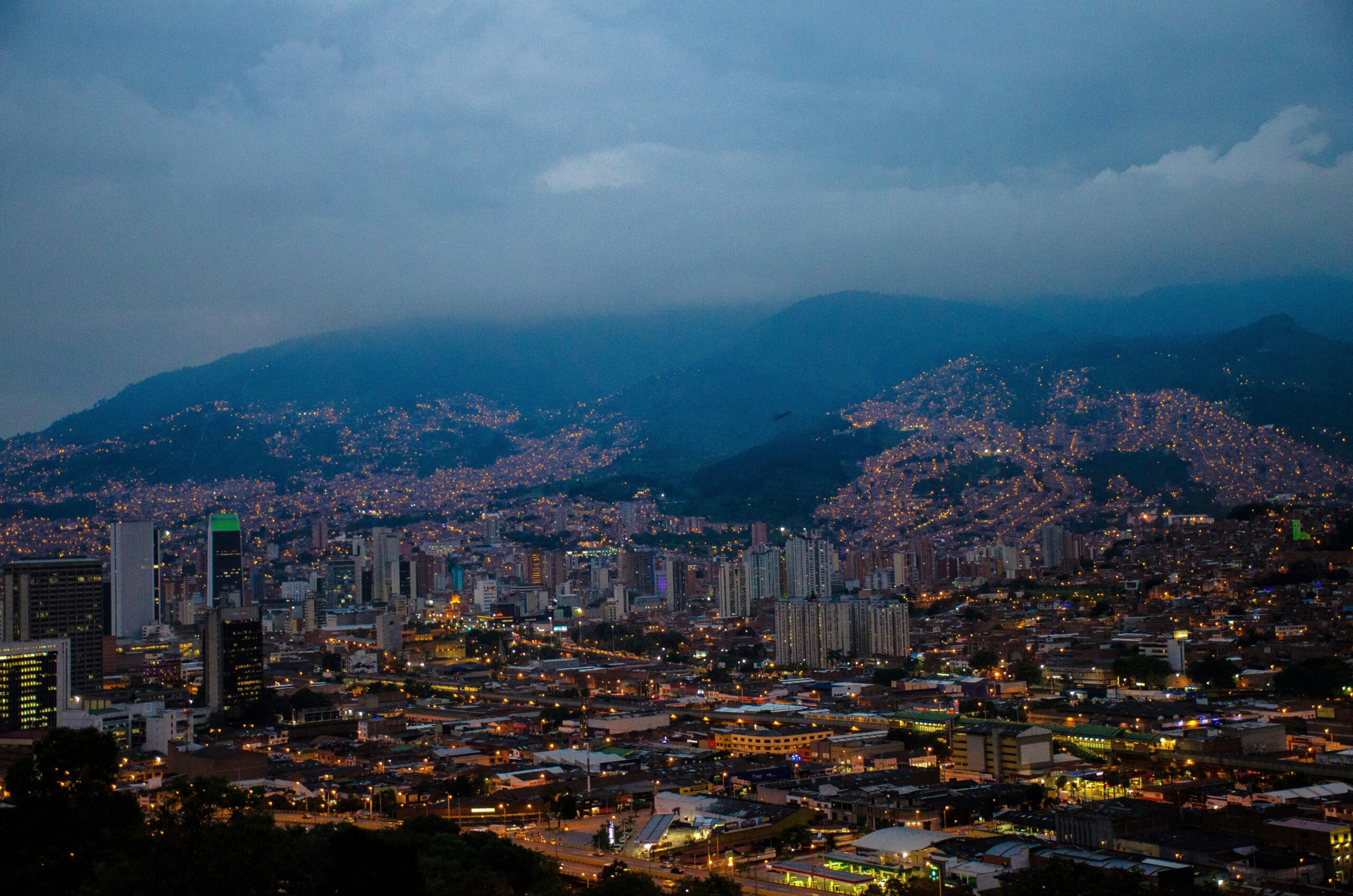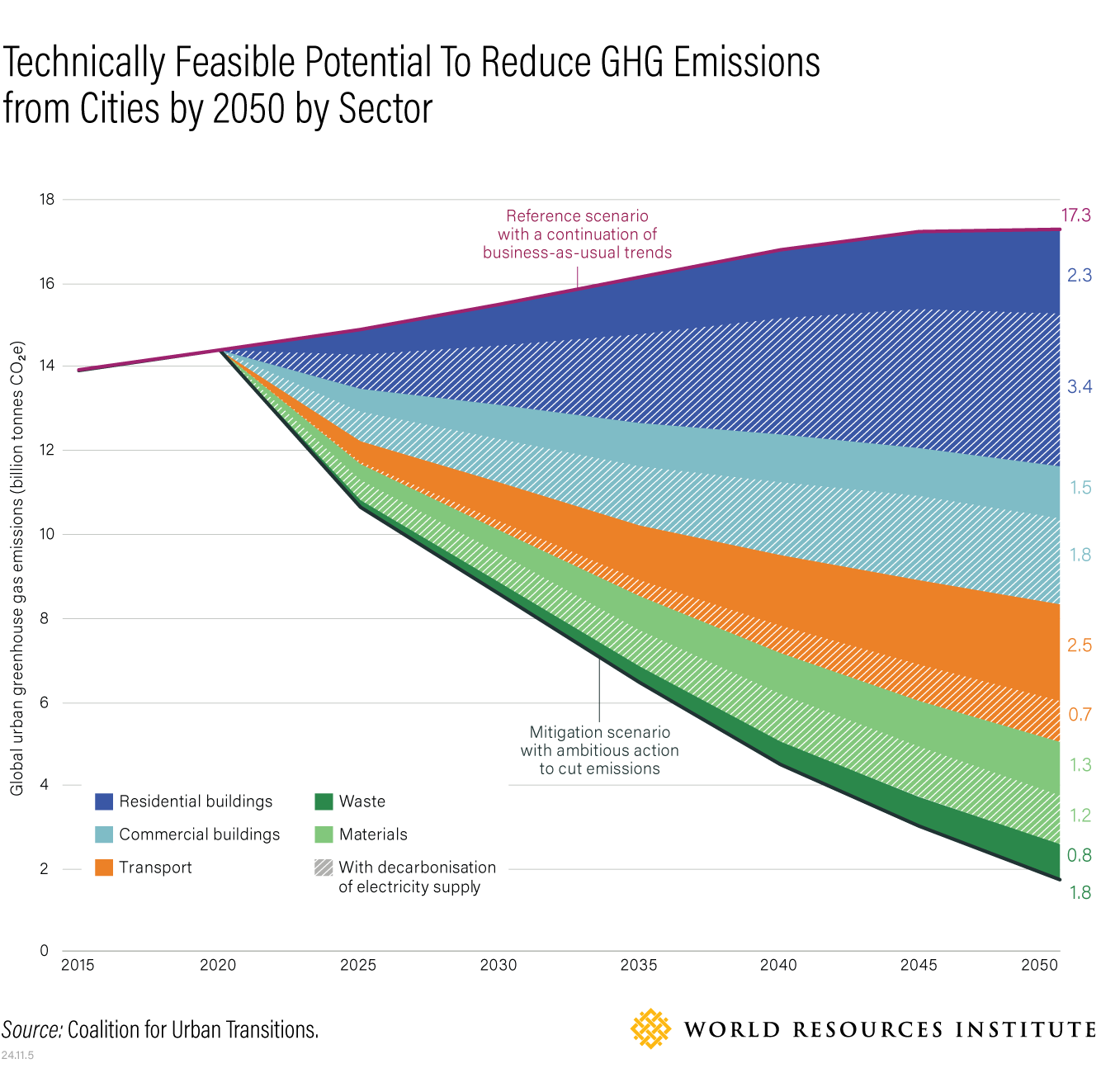
Cities are responsible for more than 70% of global greenhouse gas (GHG) emissions and are highly vulnerable to the consequences of climate change, yet when it comes to climate action, national governments tend to take center stage. Of the 194 national climate commitments under the Paris Agreement in 2023, known as Nationally Determined Contributions (NDCs), UN-Habitat found that only 27% included solid urban content.
From local-level targets and collaborative planning processes to policies that provide municipalities with technical and financial support, there are many linkages between national governments and subnational actors that need strengthening to accelerate climate action. Cities are uniquely positioned to formulate and implement innovative practices that limit the rise of global temperature and protect human systems from an increasingly variable climate – all while improving people’s day-to-day lives.
The Coalition for High Ambition Multilevel Partnerships (CHAMP) is one effort underway to engage local actors in defining climate targets and encourage national governments to build out their urban components more deliberately. The government of Colombia – an early supporter of CHAMP – is now revamping its NDC development process with these goals in mind, setting an example for other nations to follow.
Raising Ambitions for Better NDCs
Cities are critical to climate action. If implemented properly, currently feasible low-carbon measures in cities can decrease nearly 90% of the gases that cause global warming by 2050. These gases come from critical sectors such as buildings, transport, construction and waste. Without action, global emissions could reach 17.3 billion tons of CO2e by mid-century. However, with ambitious actions in these sectors, emissions could be reduced to just 1.8 billion tons.

Recognizing the role that cities and other subnational actors need to play in delivering climate action, CHAMP was launched in 2023 in Dubai by the COP28 Presidency with the support of Bloomberg Philanthropies, WRI and other partners. The overarching goal of CHAMP is to limit global temperature rise to 1.5 degrees C above pre-industrial levels and increase climate adaptation and resilience by supporting climate action at the local level.
To date, 74 national governments have endorsed the CHAMP declaration, committing to working with their subnational governments – cities, towns, states and regions – to develop and implement national-level climate strategies. Specifically, these countries have pledged to consult and collaborate with subnational governments in preparing their next round of NDCs, to be presented at COP30 in Brazil in 2025.
Championing a New NDC Process in Colombia
Colombia was among the supporters of the CHAMP declaration at COP28, and since then, WRI Colombia has supported the nation’s Ministry of Environment and Sustainable Development in formulating a participation strategy for subnational governments to get involved in the country’s NDC 3.0 update process.
Under the Paris Agreement, NDCs are meant to be updated every five years by parties (national governments), with increasing levels of ambition each time. Taken together, these NDCs determine whether the world keeps GHG emissions in check or not.
Like all countries, Colombia’s next NDC is due in 2025. WRI Colombia and the Ministry of Environment, with the support of Germany’s International Climate Initiative (IKI) and Bloomberg Philanthropies, launched a series of regional dialogues and workshops across the country in 2024 to update the country’s climate measures. This updated process is better engaging urban leaders but also other elements of civil society, including regional leaders, the private sector, business associations and interest groups.
In addition to discussing priorities related to mitigation and climate adaptation, the workshops also address regional challenges such as achieving a just transition, peacebuilding and protecting human rights.
These spaces have facilitated a fluid and transparent dialogue regarding Colombia’s binding commitments under the Paris Agreement. They have encouraged horizontal dialogue between different subnational government entities, beyond those responsible for environmental issues. Such intersectoral and intersectional dialogue has enabled women, young people and people with different abilities to participate in the dialogues or workshops and thus discuss, design and support measures that are important them.
The dialogues that have taken place so far have helped identify some initial obstacles, limitations and concerns of subnational governments in implementing climate action measures:
- Where they exist, local climate policies are often framed within development plans that last only four years, making it difficult to have a more sustained and long-term vision for addressing climate change.
- Subnational governments have expressed that it is unclear how to identify explicit incentives, particularly economic ones, for incorporating NDC-related measures in their jurisdictions.
- More robust financial support from the national government is required to implement NDC measures at the local level.
- There is a lack of technical knowledge about Colombia’s existing NDC and climate efforts, particularly in smaller municipalities. While there is interest and leadership in these areas, the lack of capacity makes implementing adaptation and mitigation projects challenging.
The Road to COP30 Goes Through Subnational Actors
Looking ahead to COP30 in Brazil, when all countries are due to update their NDCs, this initiative in Colombia is expected to generate more significant involvement of subnational actors in defining the NDC and, ultimately, in putting the country on track to meet its obligations under the Paris Agreement.
Colombia’s example is one that other countries can follow. NDCs are a fundamental pillar of the Paris Agreement, and incorporating cities into this new round of updates is an imperative. By integrating local perspectives and needs into national commitments, a more robust and compelling climate roadmap can be designed to address both immediate local challenges and medium- and long-term climate goals. What’s more, the participation of local authorities and leaders can create more responsive governance, build long-term support and is essential to closing the gap between ambition and implementation.
Through CHAMP, the aim is to strengthen the capacities of cities and subnational governments to accelerate climate action in Colombia and elsewhere. This process will not only contribute to reducing the effects of climate change but also to creating synergies between different levels of government, promoting collaboration and exchanging best practices.
The expectation is that cities and regions will not only be recognized as critical actors but lead the implementation of innovative climate solutions that can be replicated around the world.
This article originally appeared on es.wri.org in Spanish.
Héctor Miguel Donado is Research & Project Manager for WRI’s Climate, Economics and Finance program.
Walther López López is Subnational Climate Action Intern for the Climate, Economics and Finance program at WRI Colombia.








